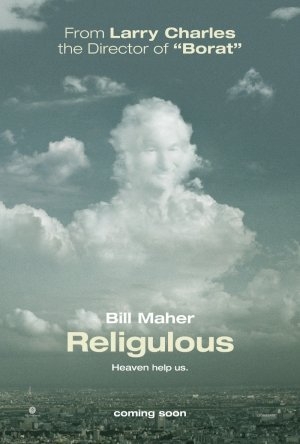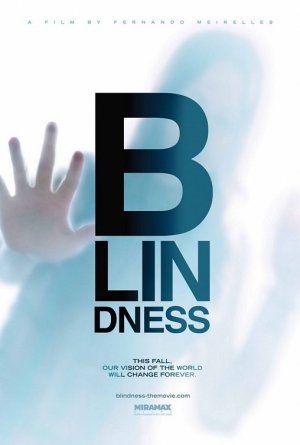 BLINDNESS (2008, directed by Fernando Mierelles, 120 minutes, Canada/Brazil)
BLINDNESS (2008, directed by Fernando Mierelles, 120 minutes, Canada/Brazil)
APPALOOSA (2008, directed by Ed Harris, 114 minutes, U.S.)
RELIGULOUS (2008, directed by Larry Charles, 101 minutes, U.S.)
BY DAN BUSKIRK FILM CRITIC
Despite Hollywood’s reputation as a Godless pit of sin, no film has ever picked a fight with The Big Man himself like Bill Maher’s documentary treatise Religulous. Disrespectful, unfair and unfortunately, frequently hilarious Maher uses a barrage of old movie clips, Daily Show-style interviews and his own biting wit to drag into the light the conflict the between our modern understanding of the world and the fantastical mythology of organized religion.
Quoting a study that finds that sixteen percent of the U.S. is atheistic this film, written by Maher and directed by Borat’s Larry Charles, seems bound to inflame the anger of the other eighty-four percent of the population. It’s not merely the impiety of his premise; Maher’s weakness as a truth-seeker is that he’s a comedian through-and-through. Religulous loves to open up arguments that Maher can shut down with a punchline. Too often the awkward believers Maher is interviewing will be mid-thought when Bill drops a zinger right in rhythm to the next cutaway. His comic timing may be impeccable but by cutting off his debaters, Maher comes off like a bullying radio host who goes to the next caller before anyone can conjure their argument.
However, if Maher’s coarse demeanor doesn’t rub you wrong the films gets a lot of mileage out of the fact that there’s no nut like a religious nut. Religulous spins through a remarkable carnival ride across the howling psyche of the American mind, from stoic religious re-enactors who crucify Jesus for five shows daily to immaculately attired gay men rendered straight by God’s power to our own divinely-guided President. When people detach their beliefs from all rational thought they are indeed something to behold. Throw in cheesy footage from absurd religious epics, pompadoured preachers speaking in tongues and Larry Charles’ skill at creating momentum from a mountain of possessed “Praise God” gibberish and it’s a minor miracle that the film remains coherently entertaining for over an hour and a half.
I was disappointed to see Bill add to the pile on to the negative portrayals of Islam. The unremarked truth about Christians is that the majority of audience realize that hucksters like Reverend Ike are not your typical Christian. With the endless depictions of evil Arabs in our mass media, I’m not so confident they have the same understanding that a suicide bomber is not your average Muslim.
– – – – – – – – – – –
Gearing us up for the upcoming Apocalypse, this week’s End Times tale comes with a prestigious linage. Brazilian  director Fernando (City of Men) Mierelles’ adapts Nobel Laureate José Saramago’s novel Blindness, a nightmare of a book that drags us through the open sewage of a society in collapse. While ultimately finding a hopeful note, the film demands a lot from its viewer, painting a grim return to animal savagery that is both phantasmagorical and plainly plausible.
director Fernando (City of Men) Mierelles’ adapts Nobel Laureate José Saramago’s novel Blindness, a nightmare of a book that drags us through the open sewage of a society in collapse. While ultimately finding a hopeful note, the film demands a lot from its viewer, painting a grim return to animal savagery that is both phantasmagorical and plainly plausible.
Beginning in a nameless city (the film was shot in Sao Paolo, Toronto and Montevideo, Uruguay) the film opens with a motorist who brings his car to a halt when he has fell into unexplained blindness. Everyone he meets along the way passes along the infection, leading to a car thief (the film’s screenwriter DonMcKellar), a prostitute (Alice Braga, niece of Brazilian diva Sonia), a homeless man (Danny Glover) a Doctor and his secretly still-sighted wife (Mark Ruffalo and Julianne Moore) to be quarantined at gun point among the masses in a makeshift concentration camp.
The blinded characters in the film describe a descent into whiteness, not blackness and Mierelles’ gives the film a unique look by showing characters abstracted into pools of over-exposed milky light as they feel around their new world. Warehoused together without their sight the characters lose their race, their names and their titles as they’re abandoned to resurrect a new society behind the walls. They struggle by in communal fashion until Gael GarciaBernal arrives and declares himself “King of Ward Three”. Like the wiseass stoner kid who sits surrounded by his buddies in the back of the classroom, Bernal summons a bratty, sadistic sort of villainy that is only too recognizable. He turns their fragile communal state into a corrupt vision of extortion and, in the darkest moments, systematic rape.
Mierelles’ could have done more to help us comprehend why Julianne Moore’s character takes so long to use the advantage of her sight yet the film’s insight into humanity and atrocity makes this extreme scenario ring with a resounding truth. With zombie holocausts becoming a standard scenario in Hollywood films, one of the more interesting elements of Blindness is that it slowly finds a way out of the abyss. Perhaps in the Northern hemisphere we see signs of societal breakdown as the end of history. In the Southern hemisphere they have the experience and wisdom to know that worlds collapse, but people survive and endure. As in City of God, Mierelles uses sound, music and flashy visuals with real dexterity and thoughtfulness, whether audiences can stomach this descent in Godless barbarism is another question; Blindness is a impressive achievement, it will be interesting to see if anyone beyond the horror movie crowd will wish to experience it.
– – – – – – – – – – – – – –
With God now dead and society in shambles, the clear morality of Ed Harris’ Appaloosa might be just the antidote. With his taut frame and his gunfighter’s squint, its surprising Harris hasn’t made a career in Westerns. Appaloosa, whose screenplay Harris co-wrote as well as directs, hits the same notes as many of Clint Eastwood’s oaters, it is an old-fashioned, unflashy story about the choices men make in their lives. Harris has little new to say about the genre, still Appaloosa will be hard for western fans to resist, honoring the genre with a number of sharply written scenes, and without any knowing spoofery or modern flash.
Harris plays Virgil, a gunman that has wandered the countryside with his deferential partner Everett (Viggo Mortensen), bringing law to dusty western towns whenever business folk can rustle up the money to hire them. When casino owner Randall Bragg (a surprisingly restrained Jeremy Irons) guns down the Marshall, Virgil and Everett cautiously set about to bring the law to town.
Harris and Mortensen are blessed with lots of fun dialogue in their scenes together, deftly coloring in their characters with a number of amusing details (they constantly are trying to increase their vocabulary with new words they only half-understand) but their symbiotic relationship is strained when the unpredictable widow Ms. French (ReneeZellweger, awfully unnatural-looking for a women of the old west) arrives in town, unescorted.
Although it is Virgil front and center in the story, it is Everett who observes the lesson that the law is best dealt out by unsentimental men who have nothing to lose. While Virgil can’t escape sentimentality the film itself does. Things might get a littlepokey in the film’s final third, yet for the most part Appaloosa spins its story with the same efficiency in which these lawmen draw their guns.
